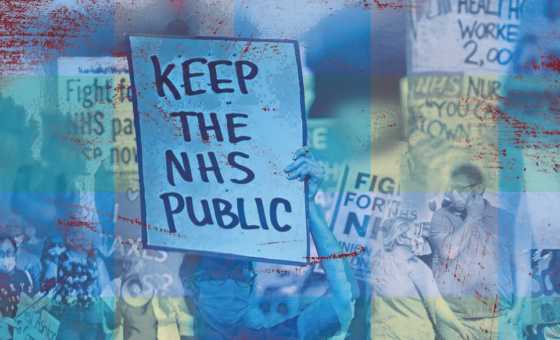This is the last article you can read this month
You can read more article this month
You can read more articles this month
Sorry your limit is up for this month
Reset on:
Please help support the Morning Star by subscribing here
THE announcement came through on April 23 that Stephen Smith, 64, had died.
The story about Smith had first been broken by Liam Thorpe of the Liverpool Echo, back in February, when he had been found fit for work despite having chronic obstructive pulmonary disease (COPD), osteoarthritis and an enlarged prostate.
When Smith became ill with pneumonia he was hospitalised. His weight dropped to a skeletal six stone. Due to his precarious health, he had to seek permission from the hospital to attend his appeal. In less than three months, he was dead.
Smith’s early death was a reminder that those with complex disabilities are still undergoing tick-box assessments, designed to confuse in order to try to “catch someone out,” with claimants having to “prove” they are disabled often to assessors who know little about the conditions they’re assessing.
The government claims it has listened, that it knows that undergoing at the very least two assessments for employment and support allowance (ESA) and personal independence payment (PIP) is stressful, and that it plans more in-house sharing between universal credit, ESA and PIP, so that claimants don’t have to send in multiple copies of the same information.
Alongside this is also a study looking at the feasibility of lumping the assessments into one, which potentially could mean all benefits are removed at the same time, rather than being staggered. This would be catastrophic to someone with disabilities.
Yet most people with disabilities say it’s not simply the number of assessments, tribunals and wrong decisions, but also the need to “prove” you are disabled.
This is something that often goes beyond the assessment into their daily lives. Disabled people find themselves permanently “on-guard” in case this action or that action is misinterpreted as them not being as disabled as they claim.
It’s hardly surprising this has happened. Disabled people know five times more officials are trying to find the elusive benefit cheats than the tax-evading rich.
They have felt the impact of the carefully cultivated suspicion against anyone with a disability, led by the tabloid press and Tory government.
Some have also experienced hate crime directly. Research has shown online hate crime against the disabled has increased by 33 per cent in the period 2017-18 compared to 2016-17.
The need to prove her disabilities, plus near to nine years of assessments and tribunals, left Kim Moore in such distress she tried to take her own life.
Moore has EDS (Ehlers-Danlos syndrome) Her type of EDS is the hypermobility type, which means she can dislocate or partially dislocate her joints.
This led to osteoarthritis, which was first diagnosed in her twenties but is now affecting every joint in her body, including her lower back.
She also has fibromyalgia, which in turn is linked to mast cell activation syndrome. On top of all of this Moore has COPD, some bladder problems, partial deafness, tinnitus and some problems with swallowing and choking. Chronic depression has also been a factor throughout her life.
All her physical conditions are degenerative, and most are progressive. Due to being stuck in an inaccessible home, she is virtually housebound.
To get the right level of ESA and PIP, Moore has had to fight for it, with each assessment resulting in a tribunal. This has been ongoing for the past nine years.
The first tribunal she had to attend was followed by a serious psychiatric breakdown and suicide attempt, where her children were given the odds of her surviving at 50:50.
Since then despite having to appeal to tribunal a number of other times, she hasn’t attended, fearful of another breakdown.
Even though the actual assessments and tribunals took such a toll on her physical and mental health, what makes it so unbearable for Moore is the feeling she’s having to “prove” she is disabled: “It’s a constant drag of what I can and can’t do.
“I don’t think I will ever lose the fear of simply putting some recycling in the box by the front door, in case a neighbour is a DWP spy and reports me. The paranoia is intense, pervasive and eroding any quality of life I had left.
“The suicide attempt was very serious and was a result of the sheer degradation, the cruelty and the endless pressure. Even though I’d won at the tribunals. I knew that for the rest of my life, I would have to keep copies of every visit to the GP, every hospital appointment, every new diagnosis and so on.
“I’m always thinking about the need to prove my disabilities, because despite my very strong medical evidence I still initially lost my benefits.
“After each assessment, the build-up, the collecting and collating hundreds of pages of proof and defence takes a toll on my conditions, causing flare-ups, which left me more permanently debilitated than I was and definitely accelerates my decline.”
Moore points out that while the welfare reforms have been ongoing, there have also been other pressures on disabled people, such as the lack of accessible and affordable homes and the pressures within the NHS and social care.
This means she doesn’t just have to fight for her benefits but also has to fight in order to get help for personal care, and practical help in managing day-to-day activities and helping her leave the house.
With other matters, such as Brexit, dominating the news, we mustn’t forget this struggle for those with disabilities.
A struggle which invades every part of their lives. A struggle that isn’t necessary and is costing the taxpayer far more than it is saving. A struggle imposed by the Tory Party, which needs to be voted out of power.
RF Hunt is an author and freelance journalist. If you are struggling with suicidal thoughts you can contact the Samaritans for free on 116 123.












